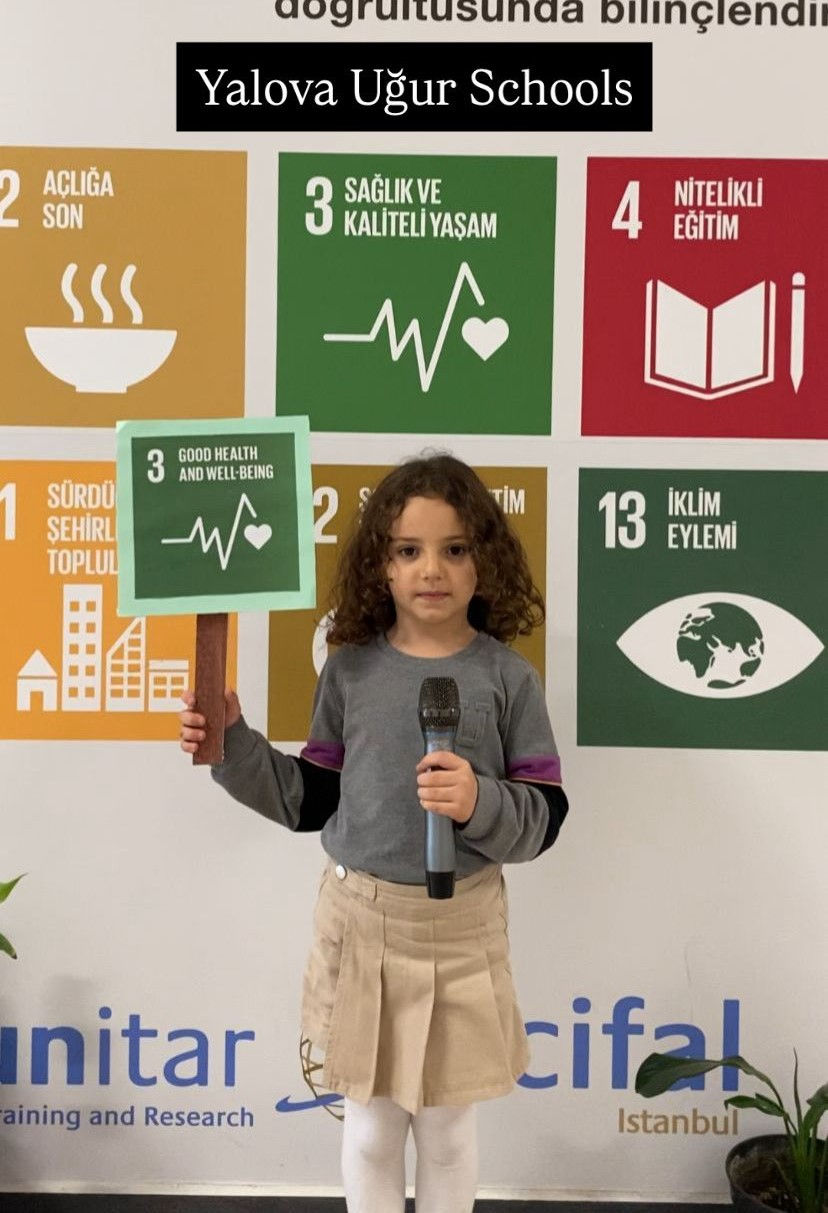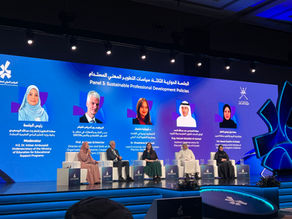HOW Uğur SchoolS' UpodcastJr TURNS LEARNERS INTO SDG LEADERS IN Türkiye
- SDSN Youth

- Nov 22, 2025
- 5 min read

The Global Schools Program consistently champions the idea that Education for Sustainable Development (ESD) is most effective when students are given true agency. This idea has been brought to life through a groundbreaking new initiative in Turkey: UpodcastJR. Launched by Uğur Schools, this program uses a student-run podcast across a network of primary schools to ensure the Sustainable Development Goals (SDGs) are not abstract concepts, but subjects led by the learners themselves.
GSP Communications Lead, Stacy Nyathi (SN), sat down with Global Schools Mentor Ece Hamret (EH), to discuss the origins of this innovative approach, the logistics of managing a student-led network, and how other schools can replicate this powerful model for student empowerment.

SN: What sparked the idea to use a student-run podcast as a tool for driving action and dialogue around the SDGs?
EH: The idea for UpodcastJR was born from a very simple yet powerful belief, that even our youngest learners can be agents of change when their voices are heard. We wanted to create a meaningful platform where primary school students could not only learn about the SDGs, but also lead conversations around them. The podcast format felt natural It gives children agency, fosters curiosity, and celebrates their authentic voices. Every Monday, one student is randomly and fairly selected to represent their peers, and by Friday, that student delivers a heartfelt message on an SDG-related topic to the entire school community. It’s short, honest, and powerful, and it reminds everyone that the SDGs are not distant global goals, but daily actions within our reach.
SN: What is the core mission of the podcast?
EH: Our mission is to empower children to become informed, articulate, and empathetic changemakers. UpodcastJR is not about perfection or performance — it’s about participation, awareness, and genuine curiosity. We aim to make sustainability education a living experience, not a textbook topic. Through weekly reflections, student research, and peer sharing, we are cultivating a generation that listens, questions, and acts.

SN: Launching a podcast across 45 schools is a huge task. What were the biggest challenges in the very beginning, getting the Admin and learners on board? How did you overcome the challenges?
EH: You’re right, coordinating across 45 campuses sounded nearly impossible at first! Our biggest challenges were consistency and confidence: ensuring every school could run the same model, and helping both teachers and students feel capable of producing quality episodes. We started small, piloting in just a few schools, offering teacher training sessions, and creating simple step-by-step guides. Once the first few episodes went live, the energy was contagious. Students loved being heard, and administrators began to see the project as a living example of the Global Schools commitment. In essence, the students convinced the adults, their enthusiasm did what no memo could achieve.

SN: With so many schools involved, how is the content creation process managed? Walk us through the journey of an idea from a student in one school to a fully produced, high-quality episode?
EH: Each Monday, a student is selected randomly at their school — ensuring fairness and inclusion. The chosen student collaborates with their teacher to select an SDG-related theme that feels relevant to their local community. Throughout the week, they research, discuss, and draft their short talk. On Friday morning, they deliver their message live during the school assembly, often in front of hundreds of peers. The best of these moments are then shared digitally with our wider UpodcastJR network, where editors help compile and curate them into thematic episodes that feature children’s voices from all over Türkiye. It’s a blend of local passion and national collaboration — a child in Izmir may be heard alongside a student in Erzurum, united by the same SDG theme.

SN: How do you ensure the podcast content is consistently and meaningfully linked back to the SDGs and relevant local realities?
EH: We built our entire structure around the SDGs — not as abstract numbers, but as daily stories. Teachers act as SDG mentors, guiding students to connect global issues to their immediate surroundings. For example, “Clean Water and Sanitation” becomes a story about conserving water in the school cafeteria, while “Responsible Consumption” becomes a project on reusing classroom materials. This localized lens ensures every episode feels real, rooted, and relatable.

SN: Tell us about the essential student roles in this operation.
EH: Students are at the heart of everything. They are the researchers, the speakers, the reporters, and the storytellers. They choose their topics, practice public speaking, share feedback with their teachers, and sometimes even record or edit short clips. More importantly, they learn to listen — to one another, to their community, and to the planet.
SN: How do you measure the success and impact of the podcast on the students?
EH: We look for impact not only in numbers, but in behaviors and attitudes. We’ve seen shy students volunteer eagerly to speak, classrooms initiate recycling campaigns, and morning assemblies turn into SDG conversations. Teachers report that students begin using SDG vocabulary naturally in their daily discussions — that’s our true success metric. The project has become a mirror of student agency, measurable through the pride in their voices and the applause that follows.
SN: Your objective is to invite other schools in the GSP network to participate. What specifically would the participation of a GSP school network look like, and what unique perspectives are you hoping they will bring to the podcast?
EH: We warmly invite GSP schools around the world to join UpodcastJR and make this platform a true global student voice network. Participating schools could easily adapt our weekly format — selecting one student each week to prepare and record a short SDG-focused reflection connected to their local reality.
To make collaboration smooth and visible, we plan to host a shared digital library where participating GSP schools can upload their student recordings as audio (mp3) or short video files. These will then be curated and published through Uğur Schools’ official Spotify and YouTube channels, allowing the voices of children from different countries to be heard side by side under one shared banner.
This collective production model will not only give our students an international stage, but also reveal the unique local perspectives of young learners—from how they experience climate action in their towns, to what “quality education” means in their classrooms.
Imagine an episode where students from Türkiye, Ghana, and Portugal all share their voices on SDG 13 — that is the kind of unity and inspiration we hope to cultivate.

SN: What piece of practical advice give to people that want to start a similar project?
EH: Start small, one microphone, one curious student, one question. Don’t wait for perfect equipment or perfect scripts. Focus on meaning, not mechanics. Encourage students to talk about what they notice in their environment and what they wish to change.
And most importantly, celebrate their voice, because confidence grows when it’s heard.

SN: Where do you see this student-led podcast network in three years, and what is your ultimate vision for how youth media can influence local action and contribute to the success of the 2030 Agenda?
EH: In three years, we see UpodcastJR evolving into a global youth podcast alliance, connecting thousands of students across continents, languages, and cultures through shared SDG storytelling. We envision an open-source library of student voices, young changemakers narrating their hopes, solutions, and small victories. Ultimately, we believe youth-led media has the power to make the SDGs not just understood but felt. When children tell the story, the world listens differently.
If you would like to collaborate with Uğur Schools in this project send us a message at socialmedia@globalschoolsprogram.org.

















the wind feels so quiet while i try to aim in ragdoll archers online and watching the arrows fly is like a little dream on my screen
Skill development improves when learning feels organized and motivating every day. This system helps learners stay focused by using clear steps and steady routines. Practice becomes easier because goals are realistic and progress is measurable. Confidence grows as skills improve through repetition and patience. Learners feel encouraged instead of pressured during the process. With guidance from https://www.predictablemastery.com/ users gain control over their learning path. The method supports consistency, discipline, and clarity. Over time, effort turns into mastery through simple actions. This journey feels positive, structured, and rewarding for anyone aiming to improve skills effectively.
His constant encouragement has had a long-term impact not only on his mentees, henry stickmin but also on the larger education community. we become what we behold
Even in brief periods of play, these decisions generate a great deal of suspense and excitement.
Retro Bowl
I've learned a lot from your posts. The way you present the information, the ease of understanding, the accuracy—everything is perfect. Thank you for sharing this valuable information. As a side note, with the number of people complaining of neck and shoulder pain due to prolonged computer work or frequent cell phone use increasing, I'd like to share a site that shares information on sports massage and massage job openings. Thank you. 마사지알바